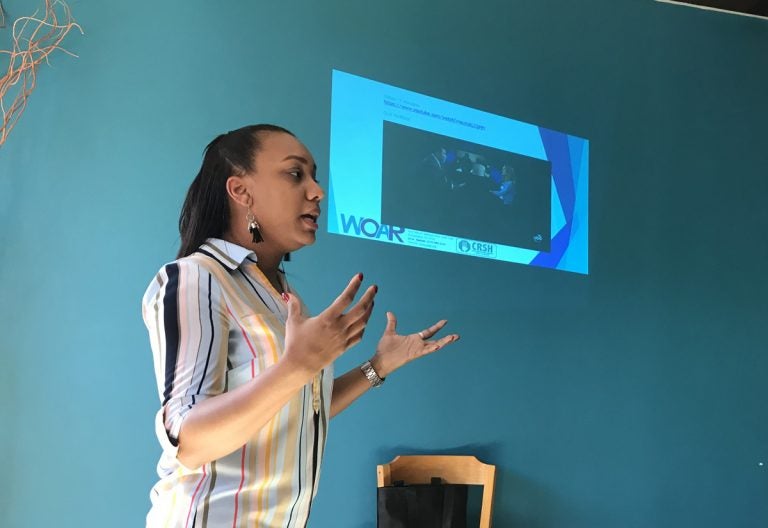A crash course in workplace sexual harassment is putting #MeToo on the menu in Philly
While sexual harassment can occur anywhere, more workers in the restaurant industry file sexual harassment claims than in any other field according to the EEOC.
Listen 4:53
Juliana Sarita from Women Organized Against Rape leads a training on workplace sexual harassment at a taqueria in South Philadelphia. (Laura Benshoff/WHYY)
Revelations from the #MeToo movement have dethroned some high-profile restaurateurs who once sat atop hospitality empires, à la Mario Batali, but there is little to show for changing a toxic culture further down the food chain.
While sexual harassment can occur anywhere, more workers in the restaurant industry file sexual harassment claims than in any other field, according to a decade of data from the U.S. Equal Employment Opportunity Commission (EEOC).
One group in Philadelphia is trying to change that.
“We hope to really get our message out to everyone in the restaurant workforce about their rights, so that it’s not just a matter of justice for people who happen to work for a newsworthy harasser,” said Nadia Hewka, an attorney with Community Legal Services of Philadelphia and one of the founders of the Coalition for Restaurant Safety and Health (CRSH).
Other members include PHILAPOSH, the Restaurant Opportunity Center (ROC) of Pennsylvania, the Philadelphia Commission on Human Relations, and Women Organized Against Rape.
At a recent training at the storefront taqueria Philly Tacos in South Philadelphia, the coalition tested out that message.
Armed with handouts and a Powerpoint presentation projected on the restaurant’s dark teal walls, Juliana Sarita, from Women Organized Against Rape, turned the dining room into a temporary classroom.
“If a customer does something, your employer has to deal with it,” she told the nine restaurant workers, owners, and advocates in attendance. If they don’t, she said, an employer can be liable if the employee sues for damages, something smaller operators may not be aware of.
Over the course of an hour, Sarita discussed the line between flirting and harassment, what constitutes harassment under the law, and where an employee can go to complain if an employer fails to act on sexual harassment in the workplace — including the Philadelphia Commission on Human Relations and the EEOC.
The coalition has also launched a hotline to answer questions about workplace sexual harassment.
This first training group is small. But, the workshop is part of a burgeoning trend.
Restaurant workers in New Orleans have started their own group called Medusa to train restaurant owners and employees to address sexual harassment, and California-based Futures Without Violence has started holding workshops.
The culture and economics of restaurant work sets a tone that is particularly suited to sexual harassment, according to researchers with the University of Colorado and University of Houston. They list several factors that contribute to restaurants’ high numbers of harassment claims, from the fact that servers depend on tips from customers to make a living wage, and that women in restaurants more often work in public-facing positions such as servers and hostesses, rather than back-of-house or management positions. Well before the #MeToo movement began, groups like ROC United highlighted this aspect of the restaurant industry. In their 2012 survey of Philadelphia restaurant workers, 34 percent of respondents said they had experienced sexual harassment at the restaurant where they currently worked.
Server Mary Garten said she reached out to the ROC of Pennsylvania after having a particularly bad experience at Baggataway Tavern in Conshohocken. Garten said a customer groped her, which she brought it to the assistant manager’s attention.
“I went over to him and I was like, ‘Hey, that regular just grabbed my ass and it made me really uncomfortable. Will you intervene?’,” she said. “Instead, what he did was he grabbed my ass and said, ‘Oh, like that?’ And so I quit.”
Baggataway Tavern did not respond to a request for comment.
Garten attended the training at Philly Tacos, and now hopes to be one of the people to take that training to restaurant workers across the city. Right now, CRSH is funded by a $10,000 grant from the Valentine Foundation, and is looking for more funding so it can pay restaurant workers to lead trainings.
Garten said she knows the difference workplace sexual harassment policies can make because they were standard when she worked as a server in Burlington, Vermont a couple of years ago.
“It was really great to be able to point to the policy and say, ‘Verbal sexual harassment is taking place in this workplace’,” she said.
In addition to promoting explicit policies, the coalition hopes to enlist bystanders who are willing to call out harassment instead of letting it fester. Alejandra Mendez has worked in food service for 12 years, currently at an upscale restaurant in Center City. While making drinks at the restaurant’s bar, she said, she usually puts her headphones in and tries to ignore the men she works with who horse around or make sexual jokes.
“No one is paying attention in this industry,” she said. “I want to learn, I want to pay attention … because when my friend got touched, she asked me what can I do and I said, ‘I have no idea.’”
CRSH’s next step is to convince more employers to get on board. WHYY reached out to several restaurant associations and prominent restaurateurs in Philadelphia area to ask about what kinds of trainings or policies are the standard for combating sexual harassment and sexual assault. Only one, the National Restaurant Association responded with a written statement.
“Our industry – like so many others – is confronting this challenge as our collective awareness has increased about this problem in society,” said association CEO Dawn Sweney. “That is why we have instituted improved training programs for our members to help prevent and respond to this behavior in the workplace.”
There is a business case for restaurant owners to take sexual harassment seriously. Having such policies lowers the likelihood that employers will be liable if employees take them to court. Restaurant owners in other cities have also reported experiencing less turnover after adopting and strictly enforcing their sexual harassment policies.
Juan Carlos Romero, who runs Philly Tacos with his wife Lluli Pilar Elias, was the only business owner at CRSH’s first training. After it wrapped up, he said he wants to adopt an anti-sexual harassment policy and “to make the workplace more welcoming,” he said, for employees as well as customers.
—
Editor’s note: This story has changed since it was first published. At the request of Alejandra Mendez, we have removed some details about her current employer.
WHYY is your source for fact-based, in-depth journalism and information. As a nonprofit organization, we rely on financial support from readers like you. Please give today.




